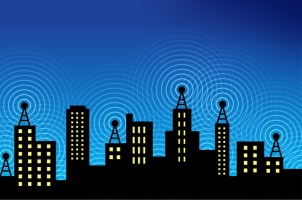5G News
In telecommunications, 5G is the fifth generation technology standard for broadband cellular networks, which cellular phone companies began deploying worldwide in 2019, and is the planned successor to the 4G networks which provide connectivity to most current cellphones. 5G networks are predicted to have more than 1.7 billion subscribers worldwide by 2025, according to the GSM Association. Like its predecessors, 5G networks are cellular networks, in which the service area is divided into small geographical areas called cells. All 5G wireless devices in a cell are connected to the Internet and telephone network by radio waves through a local antenna in the cell. The main advantage of the new networks is that they will have greater bandwidth, giving higher download speeds, eventually up to 10 gigabits per second (Gbit/s). Source: Wikipedia
Viavi reveals new ‘5G’ trial data showing extensive lab testing
Viavi Solutions has released new industry data on the state of 5G trials globally. Despite 5G standards not being expected until 2020, 25 mobile operators have already announced that they are
Read moreA smarter approach to 5G spectrum management
As Dr. Konstantinos Stavropoulos, technical marketing lead at Amdocs says, a crucial element of the proposed new Electronic Communications Code relates to radio spectrum, as follows:
Read more5G TV could become rival to cable, satellite and IPTV, says Strategy Analytics
TV and video delivery is likely to become a core capability of next generation 5G wireless services, concludes a new report from Strategy Analytics. Recent demonstrations have suggested that 5G
Read moreNetwork slicing unleashes 5G opportunities, when service quality can be assured – Part 2
The opportunities for leveraging 5G are countless, not only for provisioning applications delivering programming to mobile phones, but also to other wireless devices. Pop-up point-of-sale kiosks with customised video and
Read moreNetwork slicing unleashes 5G opportunities, when service quality can be assured – Part 1
Network slicing first appeared with 4G networks and enabled new possibilities – and this will go much farther when 5G enables network slices to incorporate the radios.
Read moreQualcomm study expects 5G to create 22m jobs, and US$12.3trn of goods and services by 2035
Qualcomm Inc.’s subsidiary, Qualcomm Technologies, Inc. has released a landmark study, The 5G Economy, examining the potential economic and social impact of 5G around the world.
Read moreUp to 200 carriers worldwide to include 5G network architecture elements in 4G networks this year
The technology, media and telecommunications (TMT) practice at business advisory firm, Deloitte, is not the first to do so but its latest report, TMT Predictions 2017, offers some interesting predictions
Read moreXura affiliates to buy Mitel Mobile and Ranzure Networks to create new player in 5G-ready mobile network solution
Xura, Inc., a provider of digital communications services, announced that its affiliates have entered into definitive agreements to acquire Mitel Mobility, Inc., a division of Mitel Networks Corporation, and Ranzure
Read moreIs 5G on a train to nowhere?
Just this week, says Robin Kent of Adax, I was on a train from Frankfurt to Nuremburg in Germany attempting in vain to get some work done.
Read moreLeveraging OSS for business benefits in digital networks
It is well acknowledged that digitisation of services and networks reduces capex as well as overall cost of operation and allows launching services that are tuned to the customer needs.
Read more











